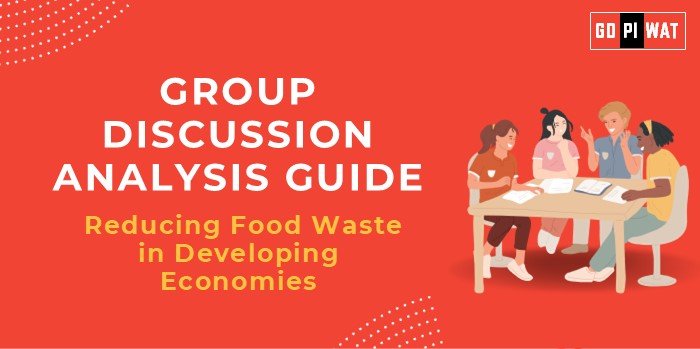📋 Group Discussion (GD) Analysis Guide: Reducing Food Waste in Developing Economies
🌍 Introduction to the Topic
📖 Opening Context
Food waste is a critical issue worldwide, but its impact is magnified in developing economies where millions face hunger daily. Reducing food waste can contribute significantly to addressing food insecurity, improving economic efficiency, and achieving sustainability goals.
📜 Background
According to the UN, one-third of all food produced globally is wasted, amounting to 1.3 billion tons annually. In developing economies, food waste predominantly occurs during production and supply chain stages due to inadequate infrastructure and inefficient processes.
📊 Quick Facts and Key Statistics
- 🌍 Global Food Waste: 1.3 billion tons annually (FAO, 2023) – equivalent to $1 trillion in economic losses.
- 🍽️ Hunger in Developing Economies: 828 million people globally are undernourished (UN, 2023).
- 🚜 Post-Harvest Losses: 20–40% of food is lost at production and supply chain stages in developing countries (World Bank, 2023).
- 🌱 Environmental Impact: Food waste contributes 8–10% of global greenhouse gas emissions.
- 🇮🇳 India’s Contribution: 40% of food produced is wasted annually, costing ₹92,000 crore (FAO, 2023).
🤝 Stakeholders and Their Roles
- 🏛️ Government Agencies: Policy-making, funding infrastructure, public awareness campaigns.
- 🏢 Private Sector: Investing in supply chain technology, adopting waste reduction practices.
- 👩🌾 Farmers and Producers: Efficient harvesting, storage, and distribution practices.
- 🌱 NGOs and International Organizations: Advocacy, capacity-building, and funding.
- 👥 Consumers: Reducing waste at household levels and supporting sustainable practices.
🏆 Achievements and Challenges
✨ Achievements
- ❄️ Improved Cold Storage: Countries like Kenya reduced post-harvest losses by 30%.
- 🍽️ Redistribution Platforms: Feeding India saved 40 million meals in 2023.
- 🏭 India’s PM Kisan Sampada Yojana: Established 300 food processing units.
⚠️ Challenges
- 🚛 Infrastructure Gaps: Limited cold storage and transport facilities.
- 📜 Policy and Regulation: Lack of effective food waste legislation.
- 💡 Consumer Awareness: Low awareness of food waste implications.
🌏 Global Comparisons
- 🇫🇷 France: Leads with strict anti-food waste laws.
- 🇷🇼 Rwanda: Innovative farm-to-market systems reduce waste.
📚 Case Studies
- 🇧🇷 Brazil’s Zero Hunger Program: Integrated food redistribution into national policy.
🗣️ Structured Arguments for Discussion
- ✅ Supporting Stance: “Investments in cold storage can significantly reduce food losses during transit and storage.”
- ❌ Opposing Stance: “Without behavior change and awareness, infrastructure alone cannot solve food waste issues.”
- ⚖️ Balanced Perspective: “A combination of improved infrastructure and consumer awareness is essential to tackling food waste sustainably.”
🎯 Effective Discussion Approaches
- 📊 Opening Approaches:
- 🌍 “Food waste in developing economies costs billions and contributes significantly to hunger—how can we optimize food systems?”
- ✨ “Despite producing sufficient food, many developing countries struggle with hunger due to inefficiencies in food systems.”
- 🔄 Counter-Argument Handling:
- “While technology solutions are costly, public-private partnerships can ensure affordability.”
🔍 Strategic Analysis of Strengths and Weaknesses
- 💪 Strengths: Growing awareness, technology adoption, public-private partnerships.
- 🤔 Weaknesses: Limited funding, policy gaps, cultural practices.
- 🚀 Opportunities: Circular economy models, international collaborations.
- ⚠️ Threats: Climate change, corruption, food price volatility.
🎓 Connecting with B-School Applications
- 🌱 Real-World Applications: Projects on supply chain optimization, CSR strategies for food redistribution.
- 📝 Sample Interview Questions:
- 💬 “How can technology help reduce food waste?”
- 💬 “Discuss the economic implications of food waste in your country.”
- 💡 Insights for Students:
- Understand supply chain dynamics, public policy impacts, and sustainable development.


